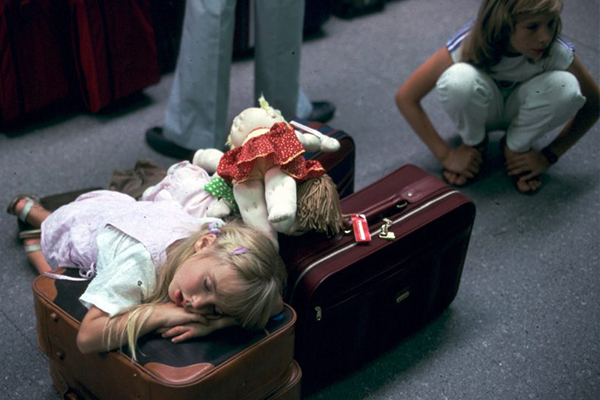Citizenship
“For our citizenship is in heaven…”
I hold the blue covered booklet in my palm. Lines of weary travelers are long. They hold passports in green, maroon, and brown, irreplaceable identities of citizens from around the globe.
I look for clues to invent their stories. A mom cradles an infant who has cried nine hours straight but now sleeps deeply, finally free from the belly of a cramped plane. Two youths, around-the-world-backpackers, sway on their feet. A young couple, whose skin reads like walking scrolls, marked and pierced, stands next to a family of five. Three dark haired, brown-eyed children huddle together and whisper. Their language comes to me with soft consonants and vowels, a latin cadence which I can’t quite put into context. Faces, tired, lined, eager, anxious, wary, and anticipating.
This routine of dazed staring, of inching forward with a worn mass of travelers seems like a reel of an old black and white movie I’ve seen before. We shove suitcases with a knee, pull one from behind, and move with a tired flow. I’ve been one of its characters enough to anticipate the next scene.
I remember when I was one of those harried moms with four jet-lagged children draped over our suitcases and carried against me. One of our daughters felt it most, a belonging in bits and pieces, and not anywhere in spades.
“I don’t feel like I’m home. Not here, not there,” she said once after returning from the US to Italy where she grew up. And the words of an old hymn played in my mind.
“This world is not my home
I’m just a-passing through…”
My treasures are laid up
Somewhere beyond the blue…”
I worried about them, my dear children of the globe, passing through time zones, flying in and out of relationships, eating what was served and sleeping where they could. Coming and going, its hollow deja-vu process of missionary life, of months that dropped into nowhere and popped up again in another place. I divided their days like pennies. “This was good. That was not,” and hoped that the good pile outgrew the not so good pile.
We walked together, my daughter and I on the street outside our Italian home. It was eons ago, when her bangs, hairspray glued were swept high and her baggy shirt held shoulder pads like a football player.
I felt her unmoored-ness. She turned her face toward me. Her blue eyes searched mine. Inside their liquid shine was a pleading for understanding, for help. I put my arm around her and squeezed her nearer, because the hurt inside me needed her comfort as much as she needed mine.
I’d studied about this. I’d prepared for my children’s lives, byproducts of choices we made, but learning and happening can be worlds apart.
Did Paul feel the lack of rootedness when he penned Phil. 3:20, “For our citizenship is in heaven, from which we also eagerly wait for the Savior, the Lord Jesus Christ?” (NASB).
I lacked right words. I felt inadequate to supply something as precious and basic as stability. None of the preparatory books about missionary kids delivered what I needed to answer the insecurity of her life.
She pushed a long strand of blonde hair behind her ear and we walked on.
”My Kingdom is not of this world…” Jesus told Pilate in John 18:36. (NASB). Did Jesus feel uprooted? “… foxes have holes and the birds of the air have nests, but the Son of Man has nowhere to lay His head.” Matt. 8:30 (NASB). Was He ready for someplace to lay His head? Did He anticipate settling into His permanent dwelling place?
I wonder how many around me are truly home.
“It’s not a good feeling,” I told my daughter, “but it is a good thing to know.”
Because if we know we are not at home, we can find our dwelling place in a Person, not a location.
In the space of our un-rootedness Jesus finds a home.
“Where is your citizenship?” This is the heartbeat question Christ followers pose to a lost world. Wherever I may be, my dwelling place is in Christ alone. And afterwards, when the tent of my body is packed away, my home has not moved. It remains in Christ alone.



.png)



